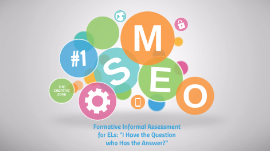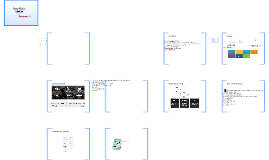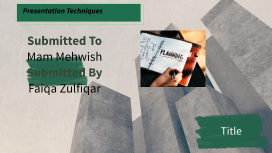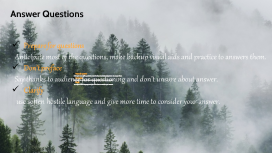Question & Answer
Transcript: Energy System Q&A What is Sustainability? Sustainability The original definition of sustainable development is usually considered to be: "Development that meets the needs of the present without compromising the ability of future generations to meet their own needs." Bruntland Report for the World Commission on Environment and Development (1992) https://dergipark.org.tr/tr/download/article-file/1125626 What are the impact areas of sustainability? Green Buildings Green Buildings Green building is a design and construction practice that causes less harm to residents and the environment than standard buildings, since it is designed and built in accordance with certain standards. General Features What are the characteristics of green buildings? Utilizing the land in the most appropriate way, Using recyclable materials, Turning towards renewable energy sources, Consuming fossil fuels as little as possible, Maximum use of daylight, Controlling indoor air quality, Saving on heating, cooling and lighting costs, Giving importance to using greywater, rainwater collection and treatment, Promotes solid waste management, Maximizing roof, wall, window insulation Flow Chart for Buildings What are the effects of green buildings Enviromental Economic Health Reducing pollution during construction Reduced energy consumption Reducing harmful gas emissions Reducing the heat island effect No light pollution Maximum use of daylight and scenery Decrease in water consumption (inside the building and in landscape areas) Improvement of indoor air quality and quantity Increasing the efficiency of building users Recycling of rain water, gray water and condensate water according to feasibility study Management of waste output Use of low-emission materials Increasing green spaces Wind Energy Wind Energy Wind is the air movements created by the sun's uneven heating and cooling of the earth and the forces that arise as a result of pressure differences. The energy of motion of this air flow is called heat wind energy. What is Betz Law? Betz's law indicates the maximum power that can be obtained from the wind, regardless of its design. It was developed by the German scientist Albert Betz. By law, no turbine can capture more than 59.3% of the power. Therefore, the factor of 16/27 (0.593) is known as the Betz coefficient. In practice, upgraded wind turbines reach the highest percentage of the Betz limit of 75-80%. Equations What is cut in speed & cut out speed? Turbines are designed to operate within a specific range of wind speeds. The limits of the range are known as the cut-in speed and cut-out speed. The cut-in speed is the point at which the wind turbine is able to generate power. Between the cut-in speed and the rated speed, where the maximum output is reached, the power output will increase cubically with wind speed.The cut-out speed is the point at which the turbine must be shut down to avoid damage to the equipment. The cut-in and cut-out speeds are related to the turbine design and size and are decided on prior to construction. Turkey Energy Outlook Turkey Energy Outlook How is the sectoral distribution of electricity consumption in Turkey? What is the Distribution of Electricity Production to Resources Geothermal Energy Geothermal Energy How is Geothermal Energy Produced? To produce power from geothermal energy, wells are dug a mile deep into underground reservoirs to access the steam and hot water there, which can then be used to drive turbines connected to electricity generators. There are three types of geothermal power plants; dry steam, flash and binary. What is Geothermal Energy advantages? Renewable resource: Geothermal energy is free and abundant. The constant flow of heat from the Earth makes this resource inexhaustible and limitless to an estimated time span of 4 billion years. Green energy: Geothermal energy is non-polluting and environment-friendly as no harmful gases are evolved with the use of geothermal energy, unlike the use of fossil fuels. Also, no residue or by-product is generated. Generation of employment: Geothermal power plants are highly sophisticated and involve large-scale research before installation. This generates employment for skilled and unskilled labourers at a very large scale at each stage of production and management. Can be used directly: In cold countries, geothermal energy is used directly for the melting of ice on the roads, heating houses in winters, greenhouses, public baths, etc. Although the initial cost of installation is very high, the cost for maintenance and repair is negligible. Ocean/Tidal Energy Ocean/Tidal Energy Ocean/Tidal Energy What is Ocean/Tidal Energy Ocean energy refers to all forms of renewable energy derived from the sea. There are three main types of ocean technology: wave, tidal and ocean thermal. All forms of energy from the ocean are still at an early stage of commercialisation. Wave energy remains more costly than the other ocean technologies. Tidal range (see How does

















